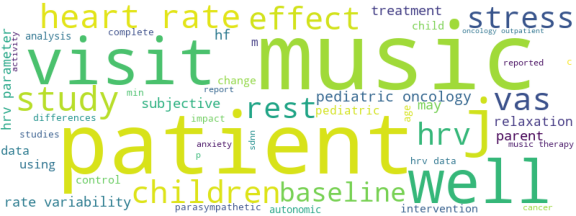| Id | 781 | |
| Author | Kemper K.J., Hamilton C.A., McLean T.W., Lovato J. | |
| Title | Impact of music on pediatric oncology outpatients | |
| Reference | Kemper K.J., Hamilton C.A., McLean T.W., Lovato J.; Impact of music on pediatric oncology outpatients ;Pediatric Research vol:64.0 issue: 1 page:105.0 |
|
| Link to article | https://www.scopus.com/inward/record.uri?eid=2-s2.0-49849102720&doi=10.1203%2fPDR.0b013e318174e6fb&partnerID=40&md5=cdcf6605463148d541a4a3f45b12571b |
|
| Abstract | Music is widely used to enhance well-being. We wished to assess musics effect on pediatric oncology outpatients. Patients who had leukemia and were in maintenance or consolidation outpatient treatment served as their own control at two visits. At visit 1, children rested for 20 min; at visit 2, for 20 min they listened to music designed to increase vitality and improve heart rate variability (HRV). At both visits, parents completed before and after treatment visual analog scales (VAS) of their childs relaxation, well-being, vitality, anxiety, stress, and depression; patients heart rates were monitored during treatments to calculate HRV. The 47 patients with complete VAS data and 34 patients with usable HRV data were similar. At baseline, VAS scores for negative states were low (average <2.5 of 10) and positive states were high (average 7> of 10). Relaxation improved more with music than rest (p < 0.01). The HRV parasympathetic parameter was significantly lower with music than rest. No other differences were significant. Further studies are needed to better delineate the relationship between subjective and objective measures of well-being among patients who are not in severe distress. Copyright © 2008 International Pediatric Research Foundation, Inc. |
|
| Keywords |
Wordcloud:



